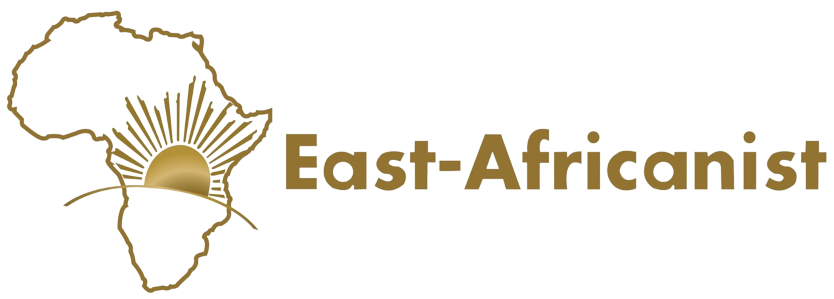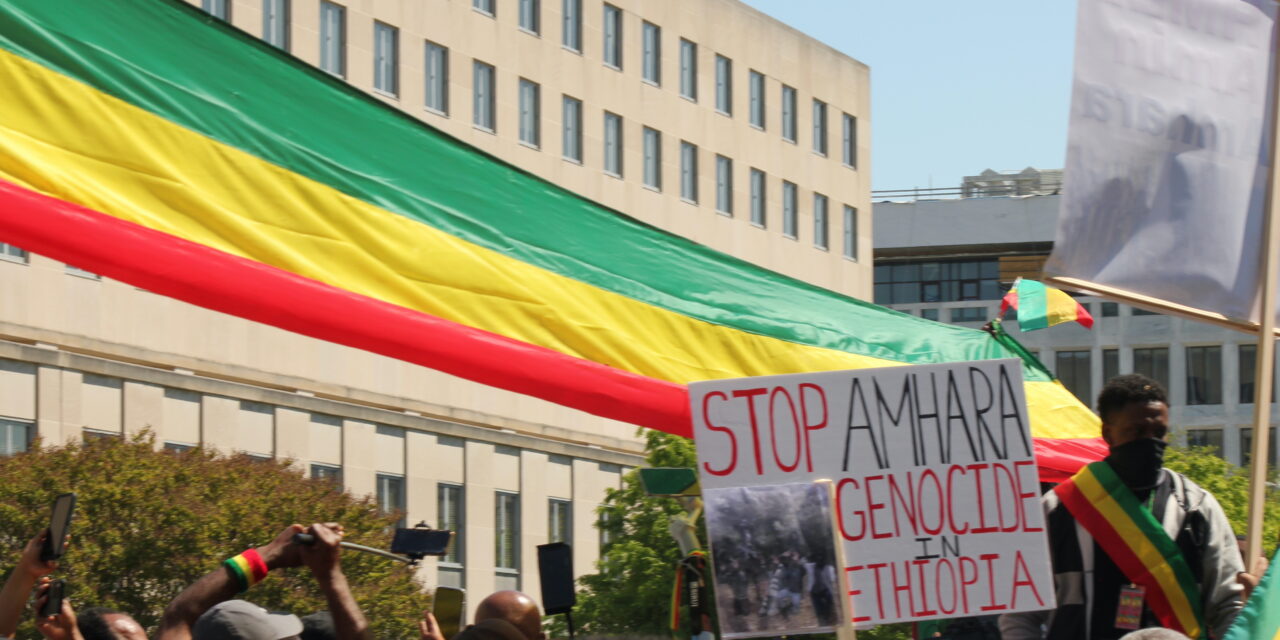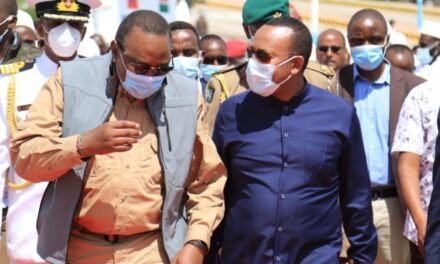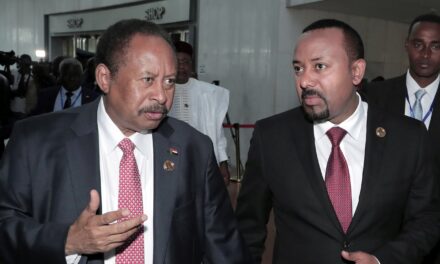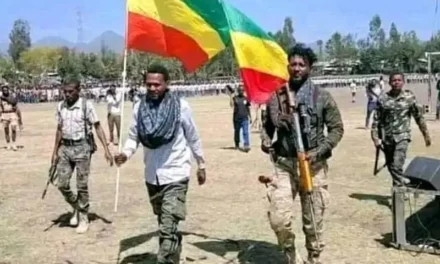By: Biruk Haregu (PhD student in Public Policy and Political Economy, and a Pre-Doctoral Fellow at James Madison University in the U.S.)
In its latest report released on October 30, 2023, the Ethiopian Human Rights Commission (EHRC) reports that the Abiy Ahmed regime continues to commit gross human rights violations in Ethiopia’s Amhara region, including extrajudicial killings, targeting civilians and civilian infrastructure with drone strikes, and using sexual violence as a weapon of war. Acts that are tantamount to war crimes and crimes against humanity.
War in the Amhara region has been raging since April 2023. The unjust war of aggression was launched by Abiy Ahmed against the Amhara region and its people under the pretext of “disarming regional special forces.” In theory, Abiy claims that his objective is to disarm and integrate regional special forces into the federal army— an objective ostensibly intended to be implemented throughout Ethiopia. In practice, however, Abiy is attempting to consolidate power by completely disarming and demobilizing Amhara forces— forces that he considers an obstacle to his authoritarianism and tyranny.
At the same time, no other region in Ethiopia has disarmed its regional forces, including Abiy’s home region of Oromia and its Oromo Special Forces— which are engaged in armed conflict in the Amhara and Somali regions— and the Tigray People’s Liberation Front (TPLF), which launched a two-year civil war against federal forces. In this context, Abiy launched his war of aggression against the Amhara region. Unsurprisingly, the unjust war of aggression has been met with a widespread popular resistance movement and armed insurgency throughout the Amhara region and beyond, led by Fano and Amhara Popular Forces. Amharas view the deployment of federal forces into the region as an attempt to subjugate the people and the region to the whims of Abiy and his Oromo Prosperity Party; while at the same time, exposing the region and its people to security threats emanating from other armed groups, namely the TPLF, Oromo Special Forces, and Oromo Liberation Army.
Since the start of the war in the Amhara region, the EHRC has reported that mass atrocities are being committed by regime forces. For instance, in its September 18, 2023 report, the EHRC states: “the Commission is deeply concerned by its findings of instances of attacks targeting civilians, extrajudicial killings and arbitrary detention, and calls for urgent attention.” The EHRC report continues: “extrajudicial killings committed by state security forces in the context of armed conflict are extremely concerning.” In short, reports of the EHRC consistently highlight that in Ethiopia’s Amhara region, the Abiy regime is: 1) targeting innocent Amhara civilians; 2) carrying out extrajudicial killings of Amharas; and 3) arbitrarily detaining Amhara civilians without due process.
In its latest report released on October 30, 2023, the EHRC is sounding the alarm once again. Specifically, regime forces have continued to: 1) indiscriminately target civilians and engage in extrajudicial killings; 2) target civilians and civilian infrastructure with drone strikes, and 3) use sexual violence as a weapon of war. For instance, the report makes clear that regime drone strikes are targeting and killing civilians. On October 5, 2023, civilians, including a 19-month-old baby were killed in drone strikes. Similarly, on October 8, 2023, at least 8 civilians were killed in a drone strike. Local residents and eyewitnesses have reported to the EHRC that innocent civilians are being killed due to the indiscriminate fire and heavy weaponry of regime forces.
Furthermore, the Abiy regime continues to engage in extrajudicial killings. In this regard, “the EHRC is receiving reliable information that extrajudicial killings, especially by members of the government’s security forces, are still continuing. In areas where conflict took place, government security forces are arresting many civilians on the street or in house-to-house raids.” Similarly, it appears that sexual violence is being used as a weapon of war. In this regard, “at least 200 rape victims have been registered in health facilities, among the victims are internally displaced women and health professionals.”
The EHRC also makes clear that civilian infrastructure is being looted and destroyed, including schools and hospitals. For example, “children are out of school and educational institutions are being used for military service” by the Abiy regime. Additionally, in many areas of the Amhara region “hospitals have stopped operating due to looting and damage.” According to the EHRC report, “Finote Selam Hospital and Tbebe Gion Hospital in Bahir Dar City were among the health facilities where services were suspended due to harassment, beatings and arrests of staff and patients” by regime forces.
In a particularly harrowing yet instructive incident, on September 6, 2023, 3,000 ethnic Amharas were targeted by regime forces and displaced from the town of Awra Godana. “Following the displacement of the residents, their crops were destroyed, their properties were looted, the roofs and doors of their houses were removed, and recently, their houses have been demolished by forces from the neighboring region with construction equipment, according to the local residents and government officials who spoke to the EHRC.” The “forces from the neighboring region” is referring to Oromo Special Forces and Oromo Liberation Army. This is a clear indication that Amharas in Ethiopia are being systematically targeted, attacked, and killed by both the military of Abiy Ahmed and Oromo regional forces. This is not a coincidence— it is a premeditated and coordinated campaign of ethnic cleansing and genocide against Amharas. The ongoing war crimes, ethnic cleansing, and genocidal violence against Amharas must stop.
In this context, how can a regime perpetrating war crimes and systemic human rights abuses, including ethnic cleansing and genocide be entrusted to facilitate a credible transitional justice process? It is increasingly evident that the rhetoric of “transitional justice” vis-à-vis armed conflict in Ethiopia is a perfunctory political exercise and not a methodical judicial process that aims to deliver justice and accountability to victims of heinous crimes being committed throughout Ethiopia. According to the findings of the United Nations International Commission of Human Rights Experts on Ethiopia, the Abiy regime is orchestrating a “flawed transitional justice process” and the regime is “unable and unwilling to administer a credible transitional justice process.” It is imperative that the international community, the human rights community, the United States, and the European Union recognize this reality and actually hold the Abiy Ahmed regime accountable.
